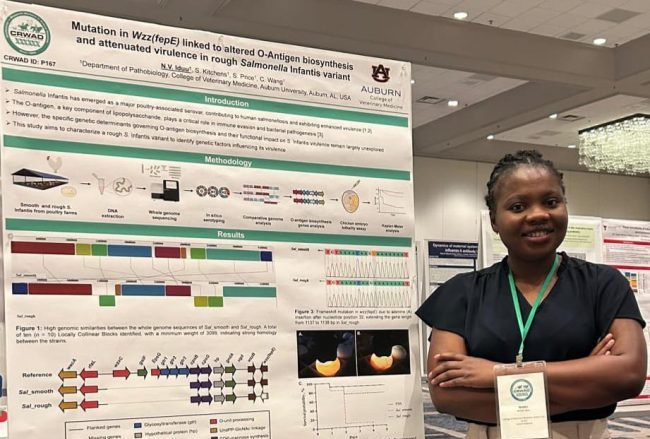Nneka Vivian Iduu, a PhD student in Biomedical Sciences, is at the forefront of revolutionizing how global foodborne pathogens are tackled through the intersection of biotechnology and data science. By harnessing advanced computational tools, Nneka is decoding the complex genomic landscape of Salmonella, one of the most persistent threats to food safety and public health worldwide. With expertise in genome sequencing and comparative genomics, Nneka’s research is uncovering key genetic factors driving virulence and antimicrobial resistance, offering novel insights into potential therapeutic targets. This pioneering work holds significant promise for developing innovative strategies to mitigate the impact of these pathogens on both animal and human health.
Nneka’s research focuses on understanding the genetic underpinnings of Salmonella pathogenesis through studying the molecular mechanisms that govern bacterial survival and infection. By identifying critical genetic patterns, Nneka’s work reveals important connections between genetic changes and the pathogen’s ability to evade host immune responses. This research has significant implications for the development of targeted vaccines and therapeutics, with the potential to address antimicrobial resistance in Salmonella and related pathogens that pose significant public health risks. Her innovative approach promises to address the persistent issue of foodborne illness in Nigeria, where Salmonella remains a major concern, and also offers solutions for tackling this issue globally.
A core strength of Nneka’s approach is the integration of bioinformatics into experimental research. Using advanced tools for genome sequencing, bioinformatics analysis, and comparative genomics, she examines genomic datasets to identify variations that contribute to pathogen persistence and virulence. This ability to extract actionable insights from complex biological data advances both fundamental research and applied strategies for public health and agricultural safety.
Building on these computational analyses, Nneka incorporates functional genomics to bridge the gap between predicted genetic variations and their biological effects. By studying how specific mutations alter Salmonella’s behavior, survival in harsh environments, and ability to evade the host immune system, she validates key genetic functions through experimental assays. This combined approach not only enhances the understanding of Salmonella pathogenesis but also provides a framework for studying other bacterial pathogens, improving food safety, and guiding the development of sustainable interventions.
Nneka’s research has garnered attention for its potential to revolutionize how we approach foodborne pathogen surveillance and control. By focusing on high-impact pathogens like Salmonella, their work is helping shape the future of global food safety, aiming to reduce outbreaks and minimize the public health burden. As antimicrobial resistance continues to escalate, Nneka’s contributions offer hope for more sustainable and effective solutions to combat some of the most dangerous pathogens threatening global health, including in Nigeria.
Beyond her scientific contributions, Nneka is committed to applying her findings to improve public health outcomes, including the development of more robust surveillance systems and diagnostic tools. She is poised to continue influencing the field of bioinformatics and pathogen genomics. Her work has the potential to not only change how we study Salmonella but to lead the charge in discovering new strategies for pathogen control, ensuring that both the food supply and public health are safeguarded against one of the most persistent threats to human health.




